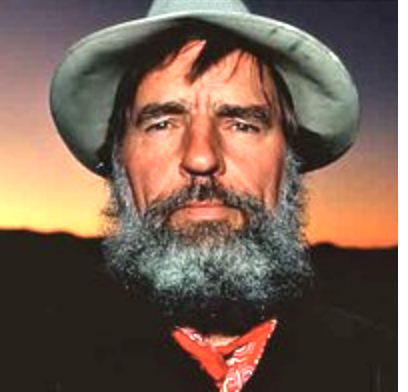On this date in 1927, author Edward Paul Abbey was born in Indiana, Pa., to Mildred (Postlewait) and Paul Abbey, the eldest of five siblings. Both were hardworking, independent persons, and while Mildred was a lifelong liberal Presbyterian, Paul was more radical, declaring himself an atheist and a socialist as a young adult. Edward Abbey served in the U.S. Army as a military police officer in Italy and then enrolled at the University of New Mexico, where he earned a B.A. in philosophy and English in 1951 and a master’s in philosophy in 1956. He married Jean Schmechal, the first of his five wives (with whom he had five children), as an undergrad. He was removed as editor of the student newspaper for putting Diderot’s famous quote, “Man will never be free until the last king is strangled with the entrails of the last priest,” on the cover of one issue.
He worked as a welfare caseworker, teacher, bus driver and technical writer before starting a career as a ranger and fire lookout at several national parks or monuments. His two seasons at Arches National Monument (later a national park) near Moab, Utah, in 1956-57 provided the grist for the book that brought him acclaim, Desert Solitaire: A Season in the Wilderness (in 1968), a nonfiction work that was preceded by three novels. His 1975 comic novel The Monkey Wrench Gang, about a group of ecological saboteurs is perhaps his best-known work. While he wrote primarily about environmental issues and land-use policies, Abbey was basically a political anarchist, and according to Wilderness.net, “he wasn’t comfortable with environmental activists or activism as a whole.”
His best friend Jack Loeffler recorded Abbey’s thoughts on religion after their 1983 camping trip in the Superstition Mountains of Arizona, included in his 1989 book Headed Upstream: Conversations with Iconoclasts, in which Abbey said, “I regard the invention of monotheism and the otherworldly God as a great setback for human life.” Abbey himself roundly condemned religion in his own works, particularly in A Voice Crying in the Wilderness, published in 1989, the year he died of esophageal hemorrhaging after surgery for a congenital circulatory disorder. “What is the difference between the Lone Ranger and God?” Abbey asked, before answering, “There really is a Lone Ranger.”


